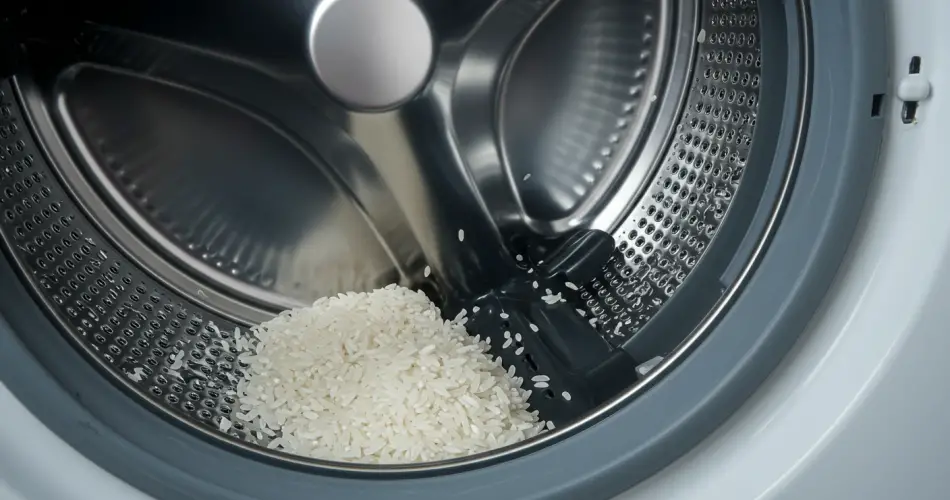When the washing machine drum starts to smell bad or show signs of mold, it’s rarely an easy fix. In most cases, it requires thorough cleaning or even professional intervention. However, there are a few simple tricks you can try at home before calling in the experts. One of the most surprising involves something you already have in your kitchen: rice.
At first glance, the idea of tossing rice into your washing machine might sound ridiculous, even counterproductive. But once you understand how it works, you may find this little household hack both clever and useful. Let’s take a closer look at why rice can help your washing machine stay fresh, how to use it safely, and what other steps you should be taking to keep your appliance in top condition.
Why Washing Machines Smell
There’s no fresher scent than laundry just out of the wash. Unfortunately, that pleasant aroma sometimes gets replaced by musty, sour odors as soon as you open the washer door. The main culprits are bacteria, mold, and detergent residue.
Because many of us wash clothes at lower temperatures to save money and energy, our machines often don’t reach the heat levels required to kill germs. As a result, moisture lingers inside the drum and detergent residue builds up in hidden corners, creating the perfect breeding ground for unpleasant smells and even visible black mold.
Routine Cleaning Is Essential
The good news is that most of these issues are preventable with regular maintenance. If you want to extend the life of your washer and avoid foul odors, here are a few key areas to focus on:
-
The detergent drawer: In most machines, this drawer is designed to be removed. Take it out once or twice a month and rinse it thoroughly under warm water to prevent detergent buildup.
-
The door seals: The rubber gasket around the washer door traps moisture and lint, making it a hotspot for mold. Wipe it down with a cloth and a mild cleaning solution after every few washes.
-
Hidden corners of the drum: Even if the drum looks clean, bacteria can hide in crevices. Periodically running a hot cycle with no laundry helps sanitize the inside.
These simple habits can make a big difference in the freshness of your laundry.
Heat and Natural Descalers
One of the most effective ways to clean your washing machine is to run what’s often called a “service wash.” Once a month, set your washer to 60°C (140°F) or higher, and run it empty with no clothes and no detergent. The hot water helps kill bacteria and remove grime that collects during cooler washes.
If you live in an area with hard water, mineral deposits can also clog the machine and leave residues on clothes. To combat this, replace your detergent with a cup of white vinegar or lemon juice during the service wash. Both act as natural descalers, breaking down limescale and leaving the washer cleaner and fresher.
The Surprising Role of Rice
So where does rice come into play? Rice is known for its excellent moisture-absorbing properties. You’ve probably seen people use it to save wet smartphones or to keep closets dry during humid weather. Those same qualities can make it useful in the laundry room.
But to be clear: you should never throw loose grains of rice directly into the washing machine. They could clog the filter or drain system. Instead, the trick is to place a handful of dry rice inside a small cloth bag or muslin pouch. Tied securely, the rice can then be placed in the drum during a wash cycle.
When combined with a few drops of your favorite essential oil—lavender, eucalyptus, or citrus are popular choices—the rice bag acts as a natural fabric softener and deodorizer. As the wash cycle runs, the rice absorbs excess moisture, while the essential oil lightly scents your clothes. The result is laundry that smells fresh and feels soft, all without the use of chemical softeners.
Beyond the Wash Cycle
Another clever use for the rice bag is to leave it inside the empty washing machine after you’ve removed your clothes. Keep the door slightly open and let the rice bag sit in the drum as the machine dries. The rice continues to absorb moisture while releasing a gentle fragrance from the essential oils. This simple step helps prevent mold from returning and keeps the washer smelling clean between uses.
Over time, you may notice your laundry coming out fresher, even if you’ve been dealing with stubborn odors before. And unlike commercial products, this solution is inexpensive, natural, and easy to prepare.
Other Household Uses for Rice
Rice isn’t just for risottos, pilafs, or casseroles. Around the home, it can play several unexpected roles:
-
As a deodorizer: Place rice in a small breathable pouch and leave it in closets, drawers, or gym bags to absorb odors.
-
For condensation control: Put rice bags near windows or in damp spaces to help reduce moisture.
-
As a fragrance booster: Mix rice with a few drops of essential oil and use it as a simple DIY air freshener.
Knowing these extra uses makes it even more appealing to keep a few rice bags handy—not just for the kitchen, but for everyday household freshness.
A Natural Alternative Worth Trying
When it comes to maintaining your washing machine, prevention is always better than repair. Regular cleaning with hot cycles, vinegar, or lemon juice will keep bacteria and limescale under control. Adding rice bags to your routine offers an extra layer of freshness, both for your machine and for your laundry.
While it may sound strange at first, using rice as a natural softener and deodorizer is a safe, eco-friendly trick that costs almost nothing. Try it once, and you might find it becomes a permanent part of your laundry care routine.



